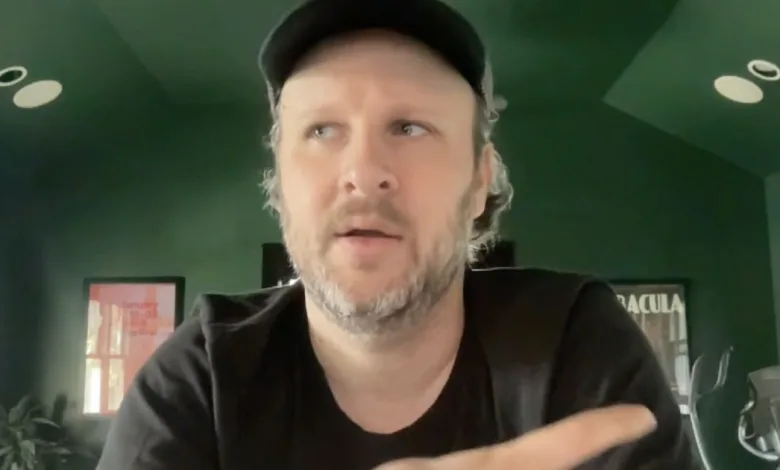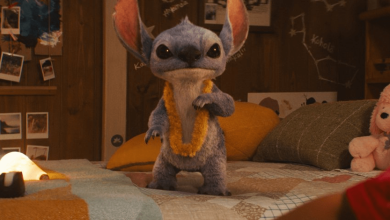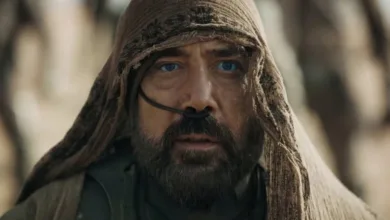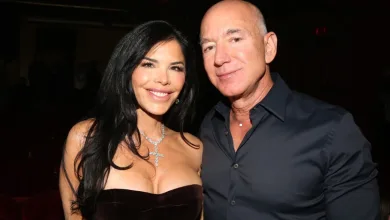Thelma Interview: Josh Margolin on Making a Tribute to His Grandma, Working With June Squibb

ComingSoon Senior Editor Brandon Schreur spoke to Josh Margolin about writing and directing 2024’s Thelma. Margolin discussed how the movie is a tribute to his grandmother, working with June Squibb and Richard Roundtree, and more. It will be released on Blu-ray, DVD, and On Demand from Magnolia Home Entertainment on Tuesday, October 8, 2024.
“The feature directorial debut of Josh Margolin, Thelma is a poignant action-comedy that gives veteran Oscar nominee June Squibb (Nebraska) her first leading role and features the final performance of trailblazing actor Richard Roundtree (Shaft),” the synopsis for the movie reads. “Squibb, who did most of her own stunts in the film, plays Thelma Post, a feisty 93-year-old grandmother who gets conned by a phone scammer pretending to be her grandson (Fred Hechinger, The White Lotus) and sets out on a treacherous quest across Los Angeles, accompanied by an aging friend and his motorized scooter, to reclaim what was taken from her.”
Brandon Schreur: Can you tell me a little bit about how this project all kind came together and what your inspirations were? I know you were obviously the screenwriter as well and I’ve seen you talk about how some of it was based on some real-life stuff. How personal of a project was Thelma for you?
Josh Margolin: It was a very personal project. It was inspired by a real-life scam that happened to my grandma, which is pretty similar to the one that’s in the movie. In real life, she luckily didn’t end up sending the money. We were able to kind of intervene at the last minute, which was a great relief. But that whole incident and seeing my grandma kind of duped in that way — especially as someone who has always been so unflappable, sturdy, and kind of unshakable — kind of stuck in my head and got me thinking. I started imagining what might have happened if she had sent it and said that she had to get it back. That became kind of the inspiration for telling this story and for the lens through which I sort of ended up writing what is essentially an ode to her spirit, her tenacity, and her characters. She’s someone I’ve just always loved, admired, and been really close to my whole life.
It is definitely based on a real person, based on sort of a real incident, and then kind of imagined from there as a vehicle to kind of explore these ideas of autonomy, aging, and things that were kind of on my mind as I was watching her go through that particular moment in her life and reckon with that chapter.
Sure. You said it perfectly. What I love about the movie is that it’s such a scary incident — that happening, being scammed like that. But then you find so much humor in it, you find so much depth and heart to it. I thought the way you combined all that was so cool and made it so fun to watch. It feels like it shouldn’t be the happiest movie in the world, but I was having a great time watching it.
Oh, I’m so glad. I appreciate that. I wanted it to have some catharsis and fun and kind of be of a piece with how I experienced time with my grandma, who is kind of all of those things. There’s heaviness, there’s real grief and stakes to this moment in her life, the things she lost and the things she’s facing. But she’s always so funny and so full of life and verve. She’s just an incredibly alive person, even in moments when she is diminished or struggling. The movie, to me, I just wanted it to be able to carry all those different facets. That’s what excited me about writing it and trying to capture her in that way.
I think you do it great, too. On top of the writing, you are also stepping into the chair as director. It’s your first big feature film. How was that experience? Was it terrifying?
It was a little bit of both. It was fun, it was scary, it was exciting. In a way, I feel lucky to have — it’s my first time directing a feature, but coming up as a writer, an editor, an actor, I feel like I’ve gotten to where there are so many of hats surrounding that role. In some ways, it felt like a big change and, in other ways, it felt like such a familiar extension of what I’d already been doing. No matter what, you’re going to feel that pressure and that fake it ‘till you make it nature where I was just like, ‘Okay, I hope everybody gets on this train with me and believes in where we’re headed.’ It was nice to have a little bit of that muscle memory, I think, so that I wasn’t going in completely blind.
Even with that, new challenges arise every day, and you surround yourself with a team of people who have done it more times than you have. That feels like an important part of the process, having a really, really strong and trusted team of collaborators with you.
I’m sure. I’m dying to talk to you about June Squibb in this movie, too, because she looks like she’s having the absolute time of her life being able to film some of the scenes in here. What was it like working with her and what kind of vibe did she bring to the set?
She was great. She really was like everything you’d hope she’d be and more. Just such a consummate pro. Like, just so on it in a way that kind of forces everyone around her to up their game, myself included — which was really nice to have, in a way, because you have someone at the center of the project who is just setting the bar really high as an actor, as a collaborator, and as a person. She was just so fun to work with. She’s so cool, she’s so matter-of-fact, smart, to the point, and someone who can just cut through BS in a really effective way, both on screen and just as a person. She just sort of inspires a certain honesty and certain frankness because she’s so open in that way, and to the point about things. I find that really refreshing; kind of a good, gravitational homebase for the movie.
She was really wonderful. She never dropped a line, which is pretty crazy for an actor of any age. She really just was so disciplined and gave so much to the movie. It was really inspiring to see and just a fun person to collaborate with. She was just a great energy on set.
She seems like it. You can tell she’s having a lot of fun in this movie.
She was having fun. She loved driving that scooter. Anytime she got a chance to be on that scooter, I think she was at her happiest.
Yeah? I was going to ask you about that, too, because in the months and weeks leading up to this movie’s release, I remember seeing headlines about how June Squibb wanted to do all her own stunts in the movie. I thought it was so funny how you kind of countered that with all the Tom Cruise and Mission: Impossible stuff, that was a hoot. I’m wondering, was there ever a moment where June Squibb was like, ‘This is something I really want to do, this kind of stunt in the movie’ and you had to be like, ‘Ehhh, let’s look at this a little closer’?
That’s a good question. I think there were probably a handful. She was pretty game for anything, which was amazing, and she did a lot more than we thought she was going to do. We had a great stunt team — our coordinator, Ryan Sturz, and her double, Heidi Pascoe — they were very involved, even when [Squibb] was performing the stunts and they were kind of coaching her through. That was fortunate, to have a great gang around her.
I’m trying to think if there was one in particular she wanted to do and we were like, ‘Ehh.’ There’s a little part where the scooter lifts up, one of the wheels lifts up, while she’s kind of veering around a corner. That was not her, fortunately. But I’m trying to remember if she was trying to make a play for that one or not.
There were definitely parts where it was like, ‘June wants to try.’ And I think that was definitely at least one of the times where we were like, ‘We’re not going to do that.’
I mean, it makes sense. But still, the scooter just looked like so much fun, I was jealous.
It was fun. I will tell you, I would sometimes drive it around in between takes just when I was trying to think or brainstorm. It was a great thing to have so I could be like, ‘I’m going to do a lap around the block, I’ll be back.’
Yup. That would have totally been me, too. I have to ask you about Richard Roundtree in this movie, too, because he’s another great, fun presence. Obviously, when you were working on the movie you didn’t know it was going to be his final performance like this. What’s it like watching it now, seeing him in here? Is it surreal at all? I mean, he’s so good in it.
He’s a wonderful actor and a really lovely guy. I feel really lucky that we got to work with him and spend time with him. I think, watching it now, it just all has a little more weight, in some way, with him. He’s already bringing so much pathos and heart and vulnerability to that part, especially to those scenes where he kind of opens up and gets to talk about his experience with his wife, aging, and all of that. It already had kind of a melancholiness to it, but I think it feels all the more sad, in some ways, than it did, just knowing that it ended up being his last role.
We didn’t know he was sick. I don’t even know if he knew that he was sick at the time. Or if he even was, or if it all kind of came after the fact. I feel like there was some awareness in him, just in where he was in his life, that he was kind of facing this new chapter. I think that was something he brought into the character and into the movie. It’s just even more poignant and vulnerable now that we know where he was at in his journey. It was always really affecting to watch his performance and, now, even more so.
Sure. And like you said, it’s sad, but I also love how it’s not a downer movie. He looks like he’s having a lot of fun, too. It’s a celebration of life, it feels like. I love the approach to it.
It is. I think he had a great time. He and June also got along really well, which was lucky. They had a good time together and I think had a lot of mutual respect. Richard was so fun to have on set. He was just a sweet, warm-hearted, funny, kind guy that everyone liked hanging out with. He had a cigar tent, which was also fun. He’d smoke the cigars on set in his tent and then he’d come out
Oh, that’s awesome.
It was very cool. We were like, ‘We’ve got to get Richard his tent,’ so we got it set up.
That’s so awesome. Another thing I love about Thelma is there are these big, laugh-out-loud moments the whole way through, it’s so funny and charming. But there’s also a whole lot of heart. I think one of my favorite scenes was when June Squibb was alone at night, she falls down, and then you see Richard Roundtree come and pick her up. I thought that was really touching. I know you edited the film as well. I’m curious what it was like trying to balance the comedy, the emotion, and the heart. Was it hard to find that sweet spot where you’re hitting all three perfectly?
Well, thank you for saying that, I really appreciate that. I think that was always the challenge of the movie. The thing that excited me was also the thing that scared me about it — trying to make sure the comedy, the human drama of it, and the genre elements of it felt like of a piece. That they were all motivated by character and something organic. It was a lot of sanding down over the course of the process, be it in the script, on set, or especially in post, like you were saying, with the edit. It was always about the ratios and how long we’re spending in this feeling vs. how long we’re spending in this one. How long can we dip into here before we have to find our way back out?
It was interesting to see, as the movie got tighter and as the edit got shorter, things started to feel like they were affecting each other more. When there’s a little more time between, Point A and Point B started to feel a little more distant — whatever energy you’re getting from over here, it didn’t feel like it was pushing us all the way to over here. As things got tighter and closer together, I think that helped. That and the score did a lot just in terms of making sure it felt like everything was of a piece and that each moment was motivating the next. If the next, whatever the flavor of that next moment was — when the movie was working, it felt like it was when those moments were kind of feeding each other. Finding the shape definitely took some trial and error; sanding down, cutting something, putting something back, cutting something else. It was a process of little adjustments over the course of a while, which got us where we landed. But, to your point, that was definitely always top of mind and something we were always trying to balance and be aware of.
I’m sure that took a lot of work. That doesn’t sound easy.
Yeah, it was definitely a process.
Kind of on the same note, I wanted to talk to you and ask you about the grandson character, too, played by Fred Hechinger. I thought he was great. He kind of, what we’re talking about, balances the heart and the humor. When you first see him, you think of all these clichés — he’s just going to be the grandson without a job who is just out here making jokes. The more the movie goes on, you can see the love and affection he has for his grandma and how much he really cares about everything and what’s going on in life. I was wondering how you went about building that character because I thought he was really great.
Oh, I’m glad. Fred is just such a fantastic actor who really just brings so much to everything he does. He’s so funny but also so natural and has a lot of depth, intelligence, and great instincts. He’s just a really great guy and a great actor. I was lucky to have Fred.
It’s funny, we did re-write the movie for Fred, basically. That role was originally around 30-something and at a different transitional moment of some burn-out and trying to figure out what’s next. When we say Fred in The White Lotus, we were like, ‘He’s so perfect for this.’ I just felt like a kindredness with him watching him; I relate to him, I think he’s so good, and I think he’d be perfect for the role. Luckily, he said yes.
What was nice with that character was it was sort of a way to express and dramatize a lot of the feelings, frustrations, and anxieties that I had growing up and had specifically in relation to my grandma getting older and facing this new moment in life. Someone who I had been so close to suddenly seemed slightly less invincible than they did and that kind of shaking up my perception of what the journey of her life and my life might be. I think, in some way, even though we’re obviously all mortal, I was just like, ‘My grandma, she’s so solid, nothing can throw her off in that way.’ Watching her come up against the inevitable trials and tribulations of age, kicked off by this incident, definitely set off my own fears about my own life and my own ability to find my way through things. That character became a way to write to those genuine anxieties and fears of my own, express them, and hope they can mirror hers in some ways so those characters can kind of be mirror images of each other. They’re at very different moments in life but, similarly, both in very important transitional moments.
Sure. I love that, that’s awesome. I remember first hearing about Thelma back in January when it was playing at Sundance. That’s when I first started seeing articles and hearing all this buzz about it. I know it got all kinds of positive reviews when it was coming out of there. Do you remember what your reaction was like when you screened Thelma for the first time and everyone is loving it?
It was a roller coaster because I was like — we had done a lot of test screenings for friends, friends of friends, extended pals, and stuff. So, in some ways, we’d shown it to a lot of people, we’d been getting good feedback and smart notes. Something about when we were actually at Sundance and we were screening it, I think it hit me like halfway through where I was like, ‘Oh god. Oh no. People are going to see this. I hope people like it.’
It was just this funny roller coaster where I was so in it, I don’t know how it’s going, I can’t tell. All I’m hearing is, ‘Is the volume too low, is it too high? Is it playing, is this right?’ Then I’d say, the night of as reviews start coming out, you start reading some and they’re like, ‘They’re kind of liking it. Did they like it? This guy liked it, this person was mixed, this person was really into it.’ You start to get a picture, but I think not until, quite honestly, a few days after is when I can see with a little more clarity that people are liking the movie. That’s great, that’s a huge relief. That’s when it hit me. I think the night and day of, there was so much happening all the time that I was just kind of on the roller coaster of, ‘Where is the floor, here? What’s the baseline?’ Once I could see the dust settle a bit is when I went, ‘Oh, I think this actually went well, that’s so exciting!’ I was able to process that in the following days.
So, day one was just kind of being along for the ride and the roller coaster of emotion of it all. As things settled in, I was like, ‘Oh, cool, thank God, I’m really happy that people were liking it.’
I’m sure that’s a good feeling when that does hit.
It was a really, really nice feeling. I was very grateful that it was connecting with people.
Definitely. What I think is so cool, too — and I’m sure you didn’t know this when you were working on it and probably not even at Sundance — but the movie was released in June. Released in theaters in June. I just think it’s awesome how there’s an action movie with a 94-year-old woman in theaters at the same time as all this giant, blockbuster superhero stuff. It’s awesome how that worked out with counter-programming and all, but this is just an experience you could have at the movies this summer.
I was so excited about that, too. Magnolia was so smart about how they released it and treating it like a summer tentpole on a smaller scale, obviously. But giving it that same placement and treating it like a summer action movie — it has other things going on and it’s a twist of that idea — but they were really bullish about just taking a shot with the movie theatrically, and I’m so glad they did. They really went to bat for us and I think it was such a smart moment to put the movie out. I’m so glad that you experienced it that way because that was the hope, that it’d feel like counter-programming but still be this summer movie that would make people go, ‘Oh, there’s an action movie with June Squibb as the lead?’ And it works.
And it totally works. I just have one more question for you here, Josh, but you’ve got Thelma that was in theaters and is coming out on physical media, now. Do you have any plans for anything after this, as far as directing goes? Or are you just taking some time to take this all in?
A little bit of both. I’m writing a new movie, I’m sort of in the midst of drafting that. I’m in the process. I’m back in the writing phase, again, which has been fun. It’s fun to kind of start digging up something new. Hopefully more on that soon, but right now, exactly, I’m back in the writing phase and trying to write this other movie that I’d love to direct. Hopefully, that will start coming together in the next little bit.
Thanks to Josh Margolin for speaking about Thelma.
Source link
#Thelma #Interview #Josh #Margolin #Making #Tribute #Grandma #Working #June #Squibb




